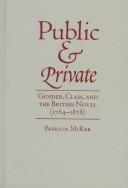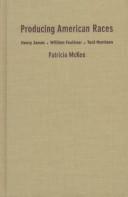| Listing 1 - 7 of 7 |
Sort by
|

ISBN: 0816629358 9780816629350 081662934X 9780816629343 0816688036 Year: 1997 Publisher: Minneapolis ; London University of Minnesota Press
Abstract | Keywords | Export | Availability | Bookmark
 Loading...
Loading...Choose an application
- Reference Manager
- EndNote
- RefWorks (Direct export to RefWorks)
Classes sociales dans la littérature --- Consommation (Economie politique) dans la littérature --- Consumptie (Economie) in de literatuur --- Consumption (Economics) in literature --- Problèmes sociaux dans la littérature --- Productie (Economische theorie) in literatuur --- Production (Economic theory) in literature --- Production (Théorie économique) in littérature --- Rôle selon le sexe dans la littérature --- Seksuele rolpatronen in de literatuur --- Sex role in literature --- Social classes in literature --- Social problems in literature --- Sociale klassen in de literatuur --- Sociale problemen in de literatuur --- Verbruik (Economie) in de literatuur --- Capitalism and literature --- Consumption (Economics) in literature. --- English fiction --- Literature and society --- Privacy in literature. --- Production (Economic theory) in literature. --- Public opinion in literature. --- Sex role in literature. --- Social classes in literature. --- Social problems in literature. --- History. --- History and criticism. --- History --- History and criticism --- 19th century --- Great Britain --- 18th century
Book
ISBN: 0691066663 1306989906 1400854156 0691611165 0691639183 9781400854158 9780691611167 9780691066660 9780691639185 Year: 1986 Publisher: Princeton, New Jersey : Princeton University Press,
Abstract | Keywords | Export | Availability | Bookmark
 Loading...
Loading...Choose an application
- Reference Manager
- EndNote
- RefWorks (Direct export to RefWorks)
Patricia McKee demonstrates that Richardson, Eliot, and James see disorderliness and indeterminacy in the human self, human relations, and literature as primary sources of meaningfulness. The relationships these novels portray as most satisfying are unsettled and unsettling, interfering with rather than contributing to social stability.Originally published in 1986.The Princeton Legacy Library uses the latest print-on-demand technology to again make available previously out-of-print books from the distinguished backlist of Princeton University Press. These editions preserve the original texts of these important books while presenting them in durable paperback and hardcover editions. The goal of the Princeton Legacy Library is to vastly increase access to the rich scholarly heritage found in the thousands of books published by Princeton University Press since its founding in 1905.
Commitment (Psychology) in literature. --- Heroes in literature. --- Social values in literature. --- Alienation (Social psychology) in literature. --- Psychological fiction, English --- History and criticism. --- James, Henry, --- Eliot, George, --- Richardson, Samuel, --- Cross, Marian Evans, --- Evans, Marian, --- Eliot, Džordž, --- Ėliot, Dzhordzh, --- Cross, Mary Ann, --- Lewes, M. E. --- Lewes, Marian Evans, --- Elliŏtʻū, Choji, --- Eliyaṭ, Jārj, --- Evans, Mary Anne, --- אליוט, ג׳ַַורג׳ --- אליוט, ג׳ורג׳, --- עליאט, דזשארדזש --- עליאט, דזשארדזש, --- עליוט ג׳יארג׳, --- עליוט, גי׳ארג׳, --- עליוט, ג׳רארג׳, --- Criticism and interpretation.
Book
ISBN: 0199333912 1306291259 0199333904 0199359709 9780199333912 9780199333905 Year: 2014 Publisher: New York : Oxford University Press,
Abstract | Keywords | Export | Availability | Bookmark
 Loading...
Loading...Choose an application
- Reference Manager
- EndNote
- RefWorks (Direct export to RefWorks)
This title uses Walter Benjamin's philosophy of history to examine four canonical Victorian novels by Dickens, Hardy, and James. Throughout its chapters, the monograph deploys the dialectical notion of the 'constellation' to read moments in novels in which past and present interpenetrate and the ways these writers open out the representation of the city to new modes of articulation and-through narrative perception- the reader's perception of the phenomena of the city, its place as the exemplar of modernity, and the ways in which it determines subjectivity.

ISBN: 082232329X 082232363X 9780822323297 0822397668 1322047553 Year: 1999 Publisher: Durham, N.C. Duke University Press
Abstract | Keywords | Export | Availability | Bookmark
 Loading...
Loading...Choose an application
- Reference Manager
- EndNote
- RefWorks (Direct export to RefWorks)
In Producing American Races Patricia McKee examines three authors who have powerfully influenced the formation of racial identities in the United States: Henry James, William Faulkner, and Toni Morrison. Using their work to argue that race becomes visible only through image production and exchange, McKee illuminates the significance that representational practice has had in the process of racial construction.McKee provides close readings of six novels—James’s The Wings of the Dove and The Golden Bowl, Faulkner’s The Sound and the Fury and Light in August, and Morrison’s Sula and Jazz—interspersed with excursions into Lacanian and Freudian theory, critical race theory, epistemology, and theories of visuality. In James and Faulkner, she finds, race is represented visually through media that highlight ways of seeing and being seen. Written in the early twentieth century, the novels of James and Faulkner reveal how whiteness depended on visual culture even before film and television became its predominant media. In Morrison, the culture is aural and oral—and often about the absence of the visual. Because Morrison’s African American communities produce identity in nonvisual, even anti-visual terms, McKee argues, they refute not just white representations of black persons as objects but also visual orders of representation that have constructed whites as subjects and blacks as objects.With a theoretical approach that both complements and transcends current scholarship about race—and especially whiteness—Producing American Races will engage scholars in American literature, critical race theory, African American studies, and cultural studies. It will also be of value to those interested in the novel as a political and aesthetic form.
African Americans in literature --- African Americans --- American fiction --- Literature and society --- Race in literature --- Whites in literature --- Whites --- Negritude --- Afro-Americans in literature --- Negroes in literature --- Race identity --- History and criticism --- History --- Ethnic identity --- Faulkner, William, --- James, Henry --- Morrison, Toni --- Dzheĭms, G. --- Dzheĭms, Genri, --- Jeimsŭ, Henri, --- Джеймс, Генри, --- ג׳יימס, הנרי, --- ג׳ײמס, הנרי, --- Τζειος, Χενρι, --- جميس، هينري، --- جيمز، هنرى --- Falkner, William, --- Fōkunā, Wiriamu, --- Фолкнер, Уильям, --- Folkner, Uilʹi︠a︡m, --- Fo-kʻo-na, --- Phōkner, Ouilliam, --- Fo-kʻo-na, Wei-lien, --- Fu-kʻo-na, --- Fu-kʻo-na, Wei-lien, --- Falkner, William Cuthbert, --- Pʻookʻŭnŏ, William, --- Foḳner, Ṿilyam, --- Pʻolkneri, Uiliam, --- K̲apākn̲ar, Villiyam, --- Fāknir, Vīlīyām, --- פוקנר --- פוקנר, וויליאם --- פוקנר, ויליאם, --- פוקנר, ןיליאם --- 福克纳威廉, --- Trueblood, Ernest V., --- Wofford, Chloe Anthony --- Morrisonová, Toni --- מוריסון, טוני --- Criticism and interpretation. --- Thematology --- Sociology of literature --- Faulkner, William --- Race in literature. --- African Americans in literature. --- Whites in literature. --- History and criticism. --- Race identity. --- James, Henry, --- White persons --- Ethnology --- Caucasian race --- White people in literature. --- White people
Book
Year: 1978 Publisher: Waltham, Mass.
Abstract | Keywords | Export | Availability | Bookmark
 Loading...
Loading...Choose an application
- Reference Manager
- EndNote
- RefWorks (Direct export to RefWorks)
Digital
ISBN: 9781400854158 9780691611167 Year: 2014 Publisher: Princeton, N.J. Princeton University Press
Abstract | Keywords | Export | Availability | Bookmark
 Loading...
Loading...Choose an application
- Reference Manager
- EndNote
- RefWorks (Direct export to RefWorks)
Digital
ISBN: 9780822397663 Year: 2017 Publisher: Durham Duke University Press
Abstract | Keywords | Export | Availability | Bookmark
 Loading...
Loading...Choose an application
- Reference Manager
- EndNote
- RefWorks (Direct export to RefWorks)
In Producing American Races Patricia McKee examines three authors who have powerfully influenced the formation of racial identities in the United States: Henry James, William Faulkner, and Toni Morrison. Using their work to argue that race becomes visible only through image production and exchange, McKee illuminates the significance that representational practice has had in the process of racial construction. McKee provides close readings of six novels—James’s The Wings of the Dove and The Golden Bowl, Faulkner’s The Sound and the Fury and Light in August, and Morrison’s Sula and Jazz—interspersed with excursions into Lacanian and Freudian theory, critical race theory, epistemology, and theories of visuality. In James and Faulkner, she finds, race is represented visually through media that highlight ways of seeing and being seen. Written in the early twentieth century, the novels of James and Faulkner reveal how whiteness depended on visual culture even before film and television became its predominant media. In Morrison, the culture is aural and oral—and often about the absence of the visual. Because Morrison’s African American communities produce identity in nonvisual, even anti-visual terms, McKee argues, they refute not just white representations of black persons as objects but also visual orders of representation that have constructed whites as subjects and blacks as objects. With a theoretical approach that both complements and transcends current scholarship about race—and especially whiteness—Producing American Races will engage scholars in American literature, critical race theory, African American studies, and cultural studies. It will also be of value to those interested in the novel as a political and aesthetic form.
| Listing 1 - 7 of 7 |
Sort by
|

 Search
Search Feedback
Feedback About UniCat
About UniCat  Help
Help News
News